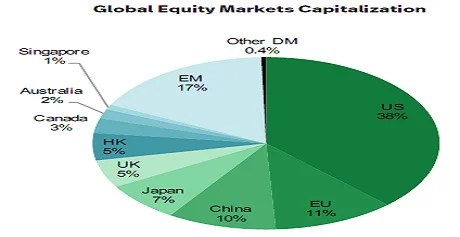Economic growth in a modern economy hinges on efficient capital markets which pool domestic savings and mobilize foreign capital for productive investments. A sophisticated capital market supports government and corporate initiatives, finances latest ideas and facilitates the management of financial risk, thereby ensuring that the funds are used for the pursuit of socioeconomic growth and development.
Furthermore, international studies also revealed that capital markets recognize and drive capital to the best ideas and enterprises. Capitalism is a catalyst for innovation, opportunity and dynamism. Coupled with the free flow of capital, innovation is an integral component for supporting job creation, economic development and prosperity. Markets facilitate the transfer of funds from those who seek a return on their assets to those who need capital and credit to grow. Clients benefiting from healthy capital markets include not just investors but also corporations and governments. Capital, increased by equity and debt, can be used to increase businesses, finance investments in new plant, equipment and technology and fund infrastructure projects. This creates jobs and flows money into the economy. Additionally, businesses and individuals can invest in securities to generate wealth.
According to the economic survey of Pakistan 2019, Pakistan’s capital markets comprise of the Pakistan Stock Exchange (PSX), the National Clearing Company of Pakistan Limited (NCCPL), the Central Depository Company (CDC), and the Pakistan Mercantile Exchange Limited (PMEX). The Securities Exchange Commission of Pakistan (SECP) serves as a regulatory body for smooth functioning of these capital markets. It is also not note that Pakistan entered a new era of equity trading after merger of Karachi Stock Exchange (KSE), Islamabad Stock Exchange (ISL) and Lahore Stock Exchange (LSE) into Pakistan Stock Exchange (PSX) in January 2016, which enhanced the operating efficiency of Pakistan’s Capital Market and offered all players with a single, deep liquidity pool and completely integrated national equity trading platform. This merger, alongside other Securities and Exchange Commission of Pakistan (SECP) reforms and Morgan Stanley Capital International (MSCI)’s classification of Pakistan as an Emerging Market in June 2016, has grown interest in Pakistan’s financial markets in the last couple of years.
Statistics revealed that the PSX index has grown from 33,229 points as on January 1, 2016, to 38,649 as on March 31, 2019, an increase of 16 percent. Fiscal year 2016-17 registered steep increase in the index, peaking at 52,876.46 on May 24, 2017; however, it could not be sustained, and the index registered an overall oscillating trend during FY2018.
[ads1]
The start of FY2019 recorded the market again gaining momentum, reaching the highest point of 43,557 on July 30, 2018, after which it started moving down, and reaching period’s lowest ending point of 36,663 on October 16, 2018. The behavior might be connected to new government’s policy actions in the form of regulatory measures and exchange rate depreciation to correct the underlying imbalances in Pakistan, mainly fiscal and current account deficits alongside overheating of the economy. Statistics also showed that the index saw growing trend after business-friendly strategies were introduced in the mini-budget of January this year, though Indian incursions in Pakistani territories on February 26, 2019, and subsequent border tensions led to a fall in confidence in the market, and index ended in at 38,649 points on March 31, 2019, whereas market capitalization was recorded to Rs.7,868.6 billion.
According to the survey 2019, the average daily value traded (T+2) in the first nine months of FY 2019 was recorded to Rs. 7.2 billion and the average daily turnover was 170 million shares. The average daily trade value in futures was registered to Rs. 2.9 billion and the trading volume was 71 million shares during the period. Furthermore, the total funds mobilized between July 2018 and March 2019 in the national stock exchange amounted to Rs. 22,350 million, as against to Rs. 14,222 million in the same period last year. This comprised of capital of new listings totaling Rs. 1,467 million, debt amount listed totaling Rs. 14,000 million and right issues equating Rs. 6,884 million.
The experts also revealed that the foreign financiers offloaded securities worth US$ 373 million which was absorbed through local financiers, Banks/DFIs, companies and insurance firms. The strong buying by domestic investors has shown the confidence of the investors in Pakistan equity market. Going forward it is expected that the market will move in upward trajectory.
Other stock market indicators witnessed mixed trends as well. The turnover of shares on PSX during July-April 2018-19 was 42.9 billion, as against to 46.5 billion shares in 12-month of FY2018. Total paid-up capital with the PSX increased from Rs 1,297.4 billion in June 2018 to Rs 1,336.7 billion in April 2019. Two new companies were listed with the PSX during July-April 2018-19, as compared to six companies in the fiscal year 2017-18. A well-developed corporate bond market is necessary for the growth of economy as it offers an additional avenue to the corporate sector to increase funds for meeting their financial needs.





